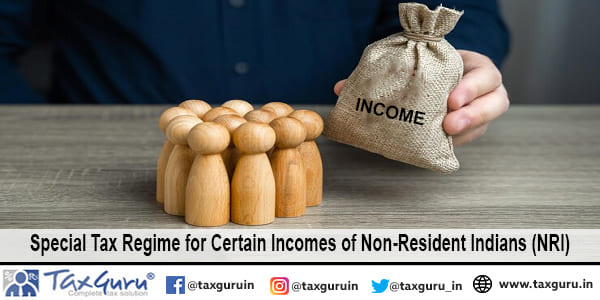The Income Tax Act,1961 encompasses various special taxation regimes for Non-Resident Indians (NRIs), among which lies a significant provision detailed in Sections 115C to 115I within Chapter XII-A of the Income Tax Act, 1961. Despite its significance, many NRI individuals still lack clarity regarding this provision and the benefits it offers.
It’s imperative to note that only individuals who are citizens of India or persons of Indian origin, but not residents, can avail themselves of this special tax regime. Specifically, the benefit is extended to assets acquired or purchased in convertible foreign currency, which include:
- Shares of Indian Companies
- Debentures of Indian Public Companies
- Deposits of Indian Public Companies
- Central Government Securities
- Any other assets as notified by the Central Government in the Official Gazette
Under this special tax regime, the following tax rates apply:
- Income from investment in specified assets: 20%
- Long-term capital gains from specified assets: 10%
- Any other income of the NRI: Normal tax provisions

Calculation of long-term capital gains on the sale or transfer of specified assets involves the following considerations:
- Indexation benefit under the second proviso to Section 48 is unavailable.
- Chapter VI-A deductions can’t be availed.
NRIs can claim exemption under Section 115F of the Income Tax Act, 1961, by reinvesting the sale consideration in another specified asset within six months from the date of transfer. The maximum exemption that we can get under this section is as below:
Exemption: Long-Term Capital Gain * Investment in any newly specified asset/ Net Sale Consideration
However, if the newly specified asset is transferred within three years of acquisition, the earlier exemption granted becomes taxable as long-term capital gain.
In cases where NRI income solely comprises investment income from specified assets or long-term capital gains from the transfer of foreign exchange assets, or both, and TDS has been deducted on such income, then he/she is not required to file the return of income under section 139(1).
Hence, it can be affirmed that investment income from the above-mentioned foreign exchange assets and long-term capital gains arising from the transfer of specified assets are treated separately and fall under the purview of the special tax regime. Any other income earned by an NRI in India is taxed according to the remaining provisions outlined in the Income Tax Act, 1961.
Conclusion: The special tax regime delineated in the Income Tax Act, 1961, for NRIs is a testament to the Indian government’s efforts to incentivize and encourage investment from the Indian diaspora. By offering reduced tax rates on investment income and long-term capital gains from specified assets, this regime not only fosters a welcoming investment environment but also aligns with the broader objective of enhancing economic ties with Non-Resident Indians. As we unravel the complexities of this provision, it becomes evident that with informed decision-making and strategic planning, NRIs can significantly benefit from this regime, optimizing their tax liabilities and maximizing returns on their investments in India. However, it is crucial to approach these opportunities with a comprehensive understanding of the legal framework and, if necessary, seek professional advice to navigate the intricacies effectively.
*****
Disclaimer: All views expressed in this article are personal and belong solely to the authors and do not represent those of people, institutions, or organizations that the authors may or may not be associated with within a personal or professional capacity unless explicitly stated. The content of this article is for informational purposes only and should not be construed as professional advice or judgment whatsoever. The readers should not construe the material contained herein as business, financial, legal, regulatory, or professional advice.






The article is exceptionally well-written, providing precise insights in a concise manner.
Thanks for your appreciation Priyanshu😊